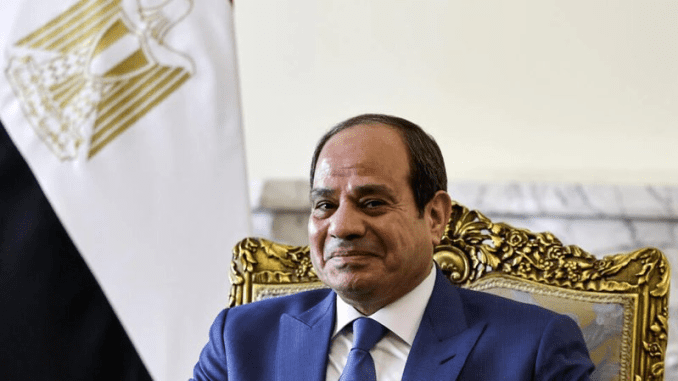
This week marks the start of Egypt’s President Abdel Fattah al-Sisi’s third term, backed by substantial fresh financing. However, many predict a difficult and protracted road out of the country’s economic catastrophe.
In the December presidential election, Sisi defeated three unknown candidates with 89.6 percent of the vote.
As per the local media, he would take the oath in front of parliament the day before he formally starts his third term on Wednesday.
The 69-year-old’s six-year term is expected to be his last unless another constitutional revision extends his office.
As Cairo battles to limit the impact from two years of excruciating economic crises and severe shortages of foreign cash, pundits have conjectured about a possible cabinet move.
The most populous nation in the Arab world appeared to be headed straight into default and economic collapse as 2024 got underway, according to observers, until it unexpectedly received more than $50 billion in loans and investments.
In a few of weeks, the World Bank and the European Union signed new finance deals, the United Arab Emirates announced a $35 billion land development deal for Egypt’s Ras al-Hikma, and the International Monetary Fund more than doubled a $3 billion loan.
According to former deputy prime minister Ziad Bahaa-Eldin, the enormous bailout has prevented Egypt “from falling into the abyss”.
The country’s fifth currency devaluation since 2016 coincided with the agreements, and economic statistics appeared to be improving.
Credit ratings for Egypt were upgraded by financial services firms as months’ worth of embargoed goods started to flow back into the country’s import-dependent economy.
Bailouts are Subject to Conditions.
However, Bahaa-Eldin stated in a recent opinion piece published in the privately held newspaper Al-Masry Al-Youm that “we shouldn’t believe the crisis has passed, or that our problems have been solved”.
According to economic consultant and former lawmaker Mohamed Fouad, “the pace of public spending, the state’s hold on the economy, and the inflation rate” are the core causes of Egypt’s issue that need to be addressed, AFP reported.
While many Egyptians are struggling to make ends meet due to the country’s current 35 percent inflation rate, this week will see Sisi take the oath of office from the New Administrative Capital, a contentious $58 billion project in the desert east of Cairo.
Requirements for Cairo include “withdrawing the state and military from economic activity” and a shift to a flexible currency rate, according to IMF chief Kristalina Georgieva. The bailout is more generous than most had anticipated.
However, pundits have cautioned that the Egyptian pound may still be supported by the government. Furthermore, “the state wants to intervene more, not withdraw” from the economy, claims Fouad.
Concern has grown that Egypt may enter a new crisis cycle if significant reform is not implemented—something the administration has promised to do.
According to Bahaa-Eldin, “we need a qualitative shift in how we manage our real economy to avoid falling into the same jam.”
Egypt is now dealing with the effects of two border wars on the region.
Over 500,000 refugees have entered Egypt from Sudan, its southern neighbor, as a result of the conflict between the regular army and paramilitary groups.
And in the Gaza Strip, surrounded on two sides by the Israeli shelling and the Egyptian border, 1.5 million Palestinians are taking refuge in the city of Rafah.
Suppression of Public Opposition
Of the 106 million people living in the nation, two thirds struggle to make ends meet after living on or below the poverty line even prior to the current crisis.
According to Mohamed Lotfy, executive head of the Egyptian Commission for Rights and Freedoms (ECRF), “people were already frustrated because they thought there was no solution.”
However, he told AFP, “they might hold out hope, they’ll expect things will get better” in light of the much-heralded large cash infusion.
“If it doesn’t, people will feel like they’ve sacrificed and waited and followed the rules, but have nothing to show for it — they still can’t afford to survive.”
Even while some Egyptians are using social media to express their dissatisfaction and sadness, there is hardly any room left for public protest.
Tens of thousands of people have been detained, human rights organizations have been prosecuted, and almost all opposition has been eliminated as a result of Cairo’s “war of attrition” against civil society during the past ten years, according to Lotfy.
When Sisi initiated a “national dialogue” and started freeing prominent political prisoners in 2022, a breakthrough appeared to be imminent, but Lotfy noted that “all those hopes were soon dashed”.
According to an ECRF count, there are currently more than twice as many freshly jailed people as released. Lotfy believes Egypt’s record on human rights “remains disastrous” and that “a sense of despair” permeates the nation.
Leave a Reply